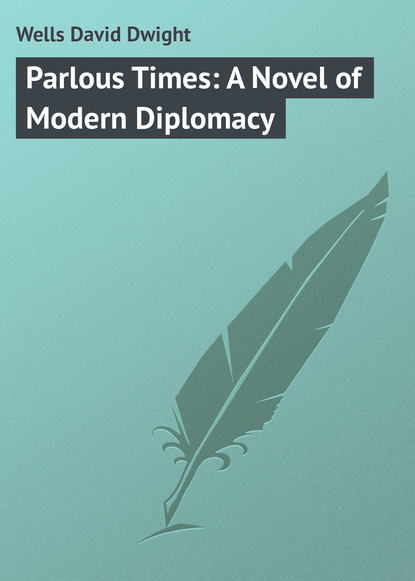По всем вопросам обращайтесь на: info@litportal.ru
(©) 2003-2024.
✖
Parlous Times: A Novel of Modern Diplomacy
Настройки чтения
Размер шрифта
Высота строк
Поля
"When you do. Till then I remain here to guard my honour."
"You surely are not trying to live up to that absurd fable!"
"Why not, when my wife has this moment left you?"
"You have sharp eyes, Colonel," replied the Secretary, turning on his heel, and walking towards the house.
"I need to have, Mr. Stanley," remarked the other, as he watched him go.
"Kent-Lauriston," said the Secretary, when they were alone after lunch, "affairs have taken a startling turn since I last saw you."
"I think so myself."
"Have you been making discoveries?"
"I don't know that they can be dignified by that name; but tell me of yours."
"Madame Darcy assures me that the letters which she holds, and on which she bases her case against her husband, are in the same handwriting as the name of Lady Isabelle, in the parish register."
"Lady Isabelle!"
"Yes. It's absurd, isn't it?"
"Perfectly so – you may take my word for it. But do you assure me that she said 'Lady Isabelle'?"
"We mentioned no names, of course. She said that the bride's signature corresponded – it's the same thing."
"Ah, I see. I think you've made a little mistake about this affair, my boy. I've seen the register myself."
"Good Heavens! You don't mean – you can't – !" exclaimed Stanley, a sickening suspicion dominating his mind.
"I mean," replied Kent-Lauriston, "that the maiden name of the bride, as written there, is not Isabelle McLane, but Isabelle Fitzgerald."
CHAPTER XXVIII
TWO QUESTIONS
Kent-Lauriston fully realised that the strong hold which he possessed over the Secretary rested, more than anything else, on the fact that his opinions were entirely reliable; and it was most important that Stanley's confidence in his friend's dicta should remain unimpaired, if that friend hoped to be able to guide him. Therefore, much as the Englishman would have liked to voice his suspicions for the Secretary's benefit, he determined to keep silence till he had full verification of his conjectures, and for this purpose he sought out Madame Darcy.
He found her at home, and she welcomed him courteously.
"Will you think me very presuming," he said, "to have called on you in the interests of a mutual friend of ours, Mr. Stanley?"
"Any friend of Mr. Stanley's can claim and receive friendship of me," she replied, a beautiful light coming over her expressive face, "for he has done me kindnesses that I can never forget or repay."
"It is in virtue of that, that I've ventured to intrude myself upon you this afternoon. You have, like myself, a great interest in his welfare, I'm sure, and I am come to make common cause with you for his good."
"You could have come to no one more willing – but will you do me the honour to accept a seat in the garden, where we can chat more at leisure."
"I shall be charmed," he said, and she led the way to a rustic bench, under the spreading branches of a gnarled, old apple-tree.
"Our friend makes no secrets of his own affairs from me, you must understand," Kent-Lauriston began, after assuring himself that they were alone, "and I imagine, from what he's said, that he's given you some inkling of his heart troubles."
"Yes," she said, "he hinted to me in London that he had some affair under consideration; but I do not think he felt deeply – as he should have felt. I trust it's not turned out seriously."
"Not as yet, I'm glad to say – but he's in some danger; and, believe me, you could not be doing him a greater service, than in helping to ward off this peril, which would be the ruin of his life."
"Indeed, yes, – but what means have I?"
"I believe you have it in your power to prove that the woman who has bewitched him, is unworthy of his love. Let him realise this and he is saved."
"But, surely, you're not alluding to the lady who formed our topic of conversation this morning?"
"I fear I am."
"But Mr. Stanley assured me that she was nothing to him."
"You were talking at cross purposes, and unintentionally deceiving each other."
"How so?"
"Why, there are two versions of the story of that marriage. The version Mr. Stanley had been told runs to this effect: – that Lieutenant Kingsland married Lady Isabelle McLane."
"But the register – "
"Says she didn't. I know, I've seen it; but our young friend has not, or had not when he last saw you."
"Then he thought I was referring to Lady Isabelle?"
"Exactly. No names were mentioned, he told me."
"True – but this is most unfortunate! Do you see my position?"
"Believe me, I'm fully informed on the matter, so that I'll not put you to the pain of relating it."
She bowed her silent thanks, and then continued: —
"The fact of this lady's marriage ties my hands. Deeply as she has wronged me, have I any right to ruin her husband's life by her exposure? If she has reformed – "
"My dear Madame Darcy, pray disabuse your mind of two misconceptions: the lady in question, Miss Fitzgerald, has not reformed, and I doubt if the marriage is legal. There's some trick about it."
"What you've told me leaves me free to act where my own honour is concerned; but I naturally feel a delicacy about interfering in Mr. Stanley's private affairs."
"Believe me, I fully appreciate your hesitation; but that there may be no misunderstanding between us regarding this important matter, let me tell you something of my friend's present position. I ask you to accept my word for it, that he's not as yet bound himself to Miss Fitzgerald; but his high sense of honour may lead him to do so, if he knows nothing definite against her."
"I see, and you want me to show him these letters?" and she took a little packet from her bosom.
"No, I wouldn't subject you to such a trying ordeal. I ask you to let me show the letters to him. Remember that you've told him that you have them."
"You surely are not trying to live up to that absurd fable!"
"Why not, when my wife has this moment left you?"
"You have sharp eyes, Colonel," replied the Secretary, turning on his heel, and walking towards the house.
"I need to have, Mr. Stanley," remarked the other, as he watched him go.
"Kent-Lauriston," said the Secretary, when they were alone after lunch, "affairs have taken a startling turn since I last saw you."
"I think so myself."
"Have you been making discoveries?"
"I don't know that they can be dignified by that name; but tell me of yours."
"Madame Darcy assures me that the letters which she holds, and on which she bases her case against her husband, are in the same handwriting as the name of Lady Isabelle, in the parish register."
"Lady Isabelle!"
"Yes. It's absurd, isn't it?"
"Perfectly so – you may take my word for it. But do you assure me that she said 'Lady Isabelle'?"
"We mentioned no names, of course. She said that the bride's signature corresponded – it's the same thing."
"Ah, I see. I think you've made a little mistake about this affair, my boy. I've seen the register myself."
"Good Heavens! You don't mean – you can't – !" exclaimed Stanley, a sickening suspicion dominating his mind.
"I mean," replied Kent-Lauriston, "that the maiden name of the bride, as written there, is not Isabelle McLane, but Isabelle Fitzgerald."
CHAPTER XXVIII
TWO QUESTIONS
Kent-Lauriston fully realised that the strong hold which he possessed over the Secretary rested, more than anything else, on the fact that his opinions were entirely reliable; and it was most important that Stanley's confidence in his friend's dicta should remain unimpaired, if that friend hoped to be able to guide him. Therefore, much as the Englishman would have liked to voice his suspicions for the Secretary's benefit, he determined to keep silence till he had full verification of his conjectures, and for this purpose he sought out Madame Darcy.
He found her at home, and she welcomed him courteously.
"Will you think me very presuming," he said, "to have called on you in the interests of a mutual friend of ours, Mr. Stanley?"
"Any friend of Mr. Stanley's can claim and receive friendship of me," she replied, a beautiful light coming over her expressive face, "for he has done me kindnesses that I can never forget or repay."
"It is in virtue of that, that I've ventured to intrude myself upon you this afternoon. You have, like myself, a great interest in his welfare, I'm sure, and I am come to make common cause with you for his good."
"You could have come to no one more willing – but will you do me the honour to accept a seat in the garden, where we can chat more at leisure."
"I shall be charmed," he said, and she led the way to a rustic bench, under the spreading branches of a gnarled, old apple-tree.
"Our friend makes no secrets of his own affairs from me, you must understand," Kent-Lauriston began, after assuring himself that they were alone, "and I imagine, from what he's said, that he's given you some inkling of his heart troubles."
"Yes," she said, "he hinted to me in London that he had some affair under consideration; but I do not think he felt deeply – as he should have felt. I trust it's not turned out seriously."
"Not as yet, I'm glad to say – but he's in some danger; and, believe me, you could not be doing him a greater service, than in helping to ward off this peril, which would be the ruin of his life."
"Indeed, yes, – but what means have I?"
"I believe you have it in your power to prove that the woman who has bewitched him, is unworthy of his love. Let him realise this and he is saved."
"But, surely, you're not alluding to the lady who formed our topic of conversation this morning?"
"I fear I am."
"But Mr. Stanley assured me that she was nothing to him."
"You were talking at cross purposes, and unintentionally deceiving each other."
"How so?"
"Why, there are two versions of the story of that marriage. The version Mr. Stanley had been told runs to this effect: – that Lieutenant Kingsland married Lady Isabelle McLane."
"But the register – "
"Says she didn't. I know, I've seen it; but our young friend has not, or had not when he last saw you."
"Then he thought I was referring to Lady Isabelle?"
"Exactly. No names were mentioned, he told me."
"True – but this is most unfortunate! Do you see my position?"
"Believe me, I'm fully informed on the matter, so that I'll not put you to the pain of relating it."
She bowed her silent thanks, and then continued: —
"The fact of this lady's marriage ties my hands. Deeply as she has wronged me, have I any right to ruin her husband's life by her exposure? If she has reformed – "
"My dear Madame Darcy, pray disabuse your mind of two misconceptions: the lady in question, Miss Fitzgerald, has not reformed, and I doubt if the marriage is legal. There's some trick about it."
"What you've told me leaves me free to act where my own honour is concerned; but I naturally feel a delicacy about interfering in Mr. Stanley's private affairs."
"Believe me, I fully appreciate your hesitation; but that there may be no misunderstanding between us regarding this important matter, let me tell you something of my friend's present position. I ask you to accept my word for it, that he's not as yet bound himself to Miss Fitzgerald; but his high sense of honour may lead him to do so, if he knows nothing definite against her."
"I see, and you want me to show him these letters?" and she took a little packet from her bosom.
"No, I wouldn't subject you to such a trying ordeal. I ask you to let me show the letters to him. Remember that you've told him that you have them."







